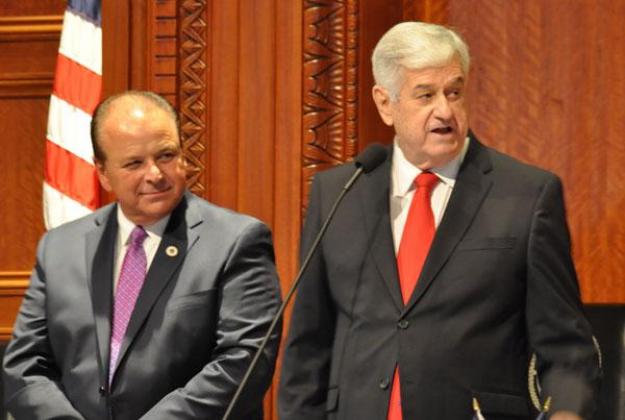
Sam Karlin /Manship School News Service
When state lawmakers ended their work last year, having passed a host of temporary tax increases to help fill a looming budget hole, many shrugged off the fact they did not make significant long-term changes to a tax code widely considered broken.
After all, the temporary taxes, most notably a one-cent increase to the sales tax, would roll off in 2018, putting pressure on the Legislature this year to make bold changes to the tax code and budget.
Plus, the 2017 regular session is a fiscal session, meaning lawmakers can consider tax changes without entering a special session, ordered by the governor.
On Monday, the Legislature began its 60-day session with that fiscal cliff once again looming. But lawmakers appear still to be politically divided, and few had optimism the various factions will be able to find compromise in an increasingly partisan and tense Legislature.
“We knew this day was coming, and I don't see the political will to get it done,” said State Rep. Rob Shadoin, R-Ruston. “I hope I’m wrong. But until we put aside the ridiculous partisan politics that has absolutely gridlocked Washington, we can expect to see some more here."
Gov. John Bel Edwards, a Democrat in an increasingly Republican state and Legislature, faces opposition from the same groups of conservatives -- mostly in the House -- who thwarted key parts of his agenda last year. Republicans have already openly criticized a key part of his tax agenda this year, a commercial activity tax on businesses that would comprise the bulk of his plan to fix the $1.3 billion budget shortfall next year.
Democrats say they are ready to come to the table with Republicans to find a middle ground to fix the perpetual budget crisis. But they argue Republicans will not be able to find overspending in agencies that have been cut several times over the past few years, since the Legislature cut taxes under former Gov. Bobby Jindal.
“We’re ready to work,” said Minden Rep. Gene Reynolds, chair of the House Democratic Caucus. “I’m not so sure about anybody else.”
But even Reynolds said his caucus has some questions for Edwards about his Commercial Activity Tax, a gross receipts tax that serves as the cornerstone of his tax plan, though Reynolds added the members are open to it.
Much of the governor’s tax and budget plan will come down to two committees -- House Appropriations, which considers state spending, and House Ways and Means, which takes on taxes. Both are heavily Republican, and represent a minefield for the governor’s allies and his comprehensive tax plan.
“It’s going to be tough,” Reynolds said. “Everyone wants cuts until the cuts come for them. Then they don’t want them.”
Alexandria Rep. Lance Harris, chair of the House GOP Caucus, said he will advocate for a “stand-still budget,” where the state keeps in place cuts already made this year. By his count, that would reduce the $1.3 billion budget shortfall next year to around $600 million.
But to deal with that shortfall, Harris said he does not have a plan in place that would fill the gap. He said he is open to rolling back tax expenditures -- credits and exemptions the state implemented as incentives to business or tax breaks for individuals, also part of the governor’s plan.
“We have to make sure the money is being spent right,” Harris said, adding it is still “early in the game,” and he is confident the Legislature will get it done.
If lawmakers fail to fill the entire budget shortfall for next year, Edwards warned in his speech he might call them into another special session. Edwards called two special sessions last year and one this year to deal with budget shortfalls.
Edwards also lamented the partisanship he said has proliferated at the capitol, obstructing real work. He cautioned legislators against using “political sound bites” instead of considering the real policy ramifications of cutting state services.
“If we can get to a place where the people in this building are having an informed, logical dialogue … we’ll be in good shape,” said State Rep. Julie Stokes, R-Kenner. “I’m not so sure the partisan politics won’t tear apart that process.”
